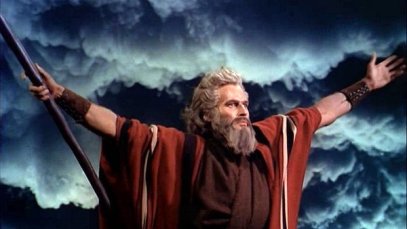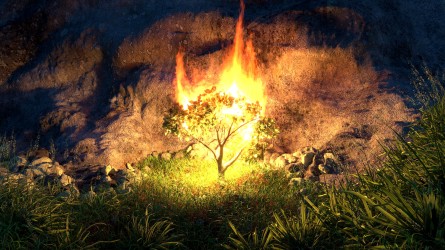A sermon preached at Southminster Presbyterian Church on May 27, 2018
Exodus 3:1-17
Today we begin a sermon series about Moses. We will only hit some highlights (and a few lowlights). If you don’t know much about Moses, other than that he looked a lot like Charlton Heston, I hope it will inspire you to read the rest of his story, primarily found in the book of Exodus.
Moses’ story actually begins long long ago, far far away, in the time of Pharaoh, who was afraid of the sheer number of Hebrew people he had enslaved. He instructed the boy children of the Hebrew slaves be thrown into the Nile River to die. Moses should have been one of those babies. Moses’ mother didn’t throw him into the Nile, but did set him afloat in a raft on that river, proving that women in desperate straits will be desperately creative, all because of the love of their children.
Here the Bible gives us our first illustration of open adoption. As a birth mother who realized she could not parent the child she loved, Moses’ mother set him loose on the waters of God’s beautiful and dangerous world and trusted that there would be life for him, trusted God would be with him even when she couldn’t be.
Moses was adopted by Pharaoh’s daughter and grew up in Pharaoh’s house, but ended up between two worlds. He had the privilege of wealth and power, but still knew he was a child of Hebrew slaves. He identified with the Hebrew people, but they didn’t identify with him. He was between two worlds. Moses killed an Egyptian when he saw him beating a Hebrew slave, and ended up fleeing the court, fearing for his life.
He ended up in Midian, where he helped the daughters of a priest water their flocks, and was given a wife in compensation. ahem. He stayed with that family, tending flocks, not dealing with the issues that put him on the run. One might say he was in a rut, going nowhere slowly.
Moses has gone from living in the palace to tending flocks on the hillside. The text tells us he is beyond the wilderness. He’s 40 miles past the end of nowhere. And he sees a bush. Burning. But not burning up. And he thinks, “hmmm…wonder what’s going on?” And God speaks to him from the burning bush.
Here’s what I noticed for the first time about a story that was pretty familiar to me. It says that God spoke to Moses “when the LORD saw that Moses had turned aside to see”.
What if Moses hadn’t turned aside to see?
What if Moses hadn’t been curious?
What if Moses had thought, “oh great, a bush is on fire. Better take this other trail and stay away….”
Would God have talked to him then?
The text makes it sound as if Moses became God’s conversation partner because of his curiosity.
“When the LORD saw that he had turned aside to see, God called to him out of the bush, “Moses, Moses!”
Moses had his first opportunity to engage God when he stopped and turned aside to see what was going on. The second opportunity was when he heard a voice calling his name. He could have quickly decided that it was the heat or that he heard something funny in the wind. He could have just kept walking.
He could have decided that if, in fact, God were to speak to him, then he certainly would have spoken from a majestic and tall tree. Or he would have picked a beautiful plant. Or it would have happened back when he was living in the palace. He could have decided that God couldn’t possibly be speaking to him from a lowly piece of shrubbery, out beyond the wilderness, and kept on walking.
Moses grew up in Pharaoh’s court, where if gods were present, it was in the midst of decorations of gold, with great fanfare, and in the midst of ritual worship. It is only when Moses is out beyond the wilderness, with his flocks and a bunch of scrub brush, that he hears his name and somehow knows to answer, “Here I am.”
This is the Moses I want to be like. Not the big hero leading the people. But the shepherd, out beyond the wilderness, with enough curiosity to engage the Divine in conversation. I want to be the Moses who can recognize his name when it is being called from the middle of a shrub on fire.
Moses becomes God’s conversation partner because he was willing to take the time, willing to be curious, and willing to trust that God might show up in very unlikely places.
God informs Moses that he will lead the people. Moses, the fugitive murderer/sheep tender from beyond the wilderness, will go to Pharaoh to speak for God. Moses has two questions. First, why would Pharaoh listen to me? And second, why would the Israelites listen to me?
And I think those are good questions. One could see why Pharaoh wouldn’t be so interested in hearing from the turncoat, raised with him in the palace, only to abandon the family business. And I can see why the Israelites wouldn’t listen to him either. They don’t know him. Why would they listen to him, the sheep tender from the middle of nowhere, when they know their other leaders, they trust their other leaders?
God’s answers Moses’ questions with a reassurance. God replies, “I will be with you when you go before him.”
Moses’ question to God, “who am I?”, is a mirror of how God answers Moses: “I am who I am”.
In their exchange, it occurred to me that the way God speaks to Moses also invites Moses to claim his own place in the bigger story. ‘I am the God of your father, the God of Abraham, the God of Isaac, and the God of Jacob.’
Moses may have grown up hearing the stories of pharaohs and kings of Egypt, but God reminds him there are other stories he needs to know. Of Abraham, Isaac, Jacob. Moses is a man stuck in the middle between two worlds, and as a result, he’s out beyond the wilderness and not inhabiting either of them. Moses is at a moment where he needs to choose which story he will claim.
The story God is inviting Moses to claim is not an easy one. The patriarchs and ancestors of our faith were flawed men, who led complicated lives. As we will see, it will lead Moses into conflict, struggle, wandering in the wilderness, for 40 years. It will lead him into a place where his story is deeply connected to the story of the Israelite people.
One could argue his story had always been connected to the story of the Israelites. He was a Hebrew baby, raised by Egypt, and nobody ever really forgot where he came from. But he didn’t know the story of his people. He hadn’t, before the burning bush, stopped to ask, to see the connections.
There’s a connection between his curiosity and his call. When Moses shows no curiosity, he’s tending sheep in the wilderness for a guy he randomly met. Before the burning bush, he seems like a man on autopilot, being affected by life more than having an affect on life.
When Moses’ curiosity kicks in, the whole story changes.
Where have you seen curiosity lately? For those of you who were here last week to witness the remarkable sermon by Carolyn and Steve—that story only happened because of curiosity. A willingness to take the time to listen to someone else’s story. Because they had a curiosity about each other’s story, they were able to find the connections that brought them together, find the ways the stories of their lives connected.
Noticing the things that make us different doesn’t take any curiosity, or time, or investment. Seeing differences is the default behavior on the news and in our world these days. Being willing to trust that our differences might be where God is calling us to connect—that takes curiosity. That takes a willingness to listen to someone else’s story.
Curiosity is what transforms a situation from being a random wildfire to avoid into a burning bush where God speaks.
God spoke last week, just as God spoke to Moses in a burning bush. And you all had the curiosity to turn and see. And church happened.
Where could you lean into curiosity in your own life? Where is the holy shrubbery you encounter as you go about your life that, at first glance, is on fire and to be avoided, but perhaps could use more investigation? I pray we all have curiosity that leads to divine conversations and holy understanding.
I want to leave you with a poem by Rainer Maria Rilke from his Book of Hours.
God speaks to each of us as he makes us,
then walks with us silently out of the night.
These are the words we dimly hear:
You, sent out beyond your recall,
go to the limits of your longing.
Embody me.
Flare up like a flame
and make big shadows I can move in.
Let everything happen to you: beauty and terror.
Just keep going. No feeling is final.
Don’t let yourself lose me.
Nearby is the country they call life.
You will know it by its seriousness.
Give me your hand.



Beautiful sermon, sorry I missed it this morning.
LikeLike
Thank you for being such a great sermon illustration for me!
LikeLike
I was so glad to hear the poem by Rilke in your sermon this morning! When my mom and I were living in our car in Flagstaff, AZ, we spent hours every day at a bookstore where I found The Book of Hours. I wrote this poem on scrap paper and kept it in my backpack, and it got us through some dark days. My mom now has The Book of Hours on her shelf!
LikeLike
I love that connection! It’s one of my favorite books.
LikeLiked by 1 person
Pingback: Top 10 Ways to Improve Other People | Glass Overflowing